河北省永年县第二中学2016届高三英语11月月考(期中)试题
- 格式:doc
- 大小:89.50 KB
- 文档页数:12

新课标Ⅱ第四辑2016届高三上学期第二次月考英语试题注意事项:本试卷共4页,答题卡共1页。
满分150分,考试时间120分钟。
第Ⅰ卷(共100分)第一部分听力(共两节,满分30分)第一节(共5小题;每小题1.5分,满分7.5分)听下面5段对话。
每段对话后有一个小题,从题中所给的A、B、C三个选项中选出最佳选项,并标在试卷的相应位置。
听完每段对话后,你都有10秒钟的时间来回答有关小题和阅读下一小题。
每段对话仅读一遍。
1. What do we know about the woman?A. She prefers to study at home.B. She spends much time in library.C. She is always the last one to go home.2. What are the speakers mainly talking about?A. A mayor.B. A speech.C. An article.3. When will the woman’s flyi ng class begin on Tuesday?A. At 9:00.B. At 8:00.C. At 7:30.4. Where are the cash machines?A. Opposite a bankB. Next to an Internet cafe.C. Outside a department store.5. What does the woman advise the man to do?A. Take some medicine.B. Drink plenty of hot water.C. Have hot vinegar with honey.第二节(共15小题;每小题1.5分,满分22.5分)听下面5段对话或独白。
每段对话或独白后有几个小题,从题中所给的A、B、C三个选项中选出最佳选项,并标在试卷的相应位置。
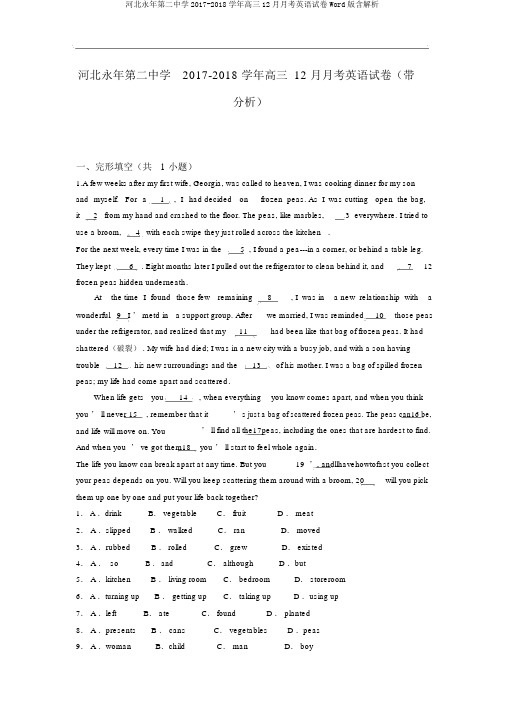
河北永年第二中学2017-2018 学年高三 12 月月考英语试卷(带分析)一、完形填空(共 1 小题)1.A few weeks after my first wife, Georgia, was called to heaven, I was cooking dinner for my sonand myself.For a1, I had decided on frozen peas. As I was cutting open the bag, it2from my hand and crashed to the floor. The peas, like marbles, 3 everywhere. I tried to use a broom,4with each swipe they just rolled across the kitchen.For the next week, every time I was in the 5 , I found a pea---in a corner, or behind a table leg. They kept6. Eight months later I pulled out the refrigerator to clean behind it, and712 frozen peas hidden underneath.At the time I found those few remaining8, I was in a new relationship with a wonderful 9 I ’ metd in a support group. After we married, I was reminded10those peas under the refrigerator, and realized that my11had been like that bag of frozen peas. It had shattered(破裂) . My wife had died; I was in a new city with a busy job, and with a son having trouble12his new surroundings and the13of his mother. I was a bag of spilled frozen peas; my life had come apart and scattered.When life gets you14, when everything you know comes apart, and when you think you ’ ll never 15, remember that it’ s just a bag of scattered frozen peas. The peas can16 be, and life will move on. You’ ll find all the17peas, including the ones that are hardest to find. And when you ’ ve got them18you ’ ll start to feel whole again.The life you know can break apart at any time. But you19 ’, andllhavehowtofast you collect your peas depends on you. Will you keep scattering them around with a broom, 20will you pick them up one by one and put your life back together?1. A .drink B. vegetable C. fruit D . meat2. A .slipped B . walked C. ran D. moved3. A .rubbed B . rolled C. grew D. existed4. A . so B . and C. although D .but5. A .kitchen B . living room C. bedroom D. storeroom6. A .turning up B . getting up C. taking up D .using up7. A .left B. ate C. found D . planted8. A .presents B . cans C. vegetables D .peas9. A .woman B.child C. man D. boy10. A . for B. of C. with D. in11. A . wife B. life C. son D. friend12. A . adjusting to B .leading to C. turning toD. adding to13. A . thank B. loss C. help D. love14. A . close B. near C. down D. wide15. A . get it B. leave it C. take it D. make it16. A . grew B .bought C. frozen D . collected17. A . specially B. fortunately C. properly D. eventually18. A . both B . all C. either D .each19. A . move on B . put on C. bring on D . call on20. A . while B. because C. or D . since二、阅读理解(共 3 小题)2.When I was a child, I often dreamed of the time when I could leave home and escape to the city. We lived on a farm and, in the winter especially, we were quite cut off from the outside world. As soon as I left school, I packed my bags and moved to the capital. However, I soon discovered that city life has its problems too.One big disadvantage is money---it costs so much to go out, not to mention basics like food and housing. Another disadvantage is pollution. I suffer from asthma( 哮喘 ), and at times the air is so bad that I am afraid to go outside. Then there is the problem of travelling round. Although I have a car, I seldom use it because of the traffic jams. One choice is to go by bicycle, but that can be quite dangerous.Of course there are advantages. First, there is so much to do in the city, whatever your tastes in culture or entertainment. Besides, there are wonderful jobs and greater chances of moving to a more important job or position. Finally, if you like shopping, the variety of goods is very surprising---and, what is more, shops are often only a short walk away.Is life better then, in the city? Perhaps it is, when you are in your teens(十几岁 ) or twenties. However, as you get older, and especially if you have small children, the peace of the countryside may seem preferable. I certainly hope to move back there soon.1. What was the writer always thinking about when he was a child?A. Staying on the farmB. Moving to the countrysideC. Leaving home for the cityD. Running away from the school2. Which of the following is true about the writer?河北永年第二中学2017-2018学年高三12月月考英语试卷Word版含解析A. He is very old now.B. He is in good health.C. He prefers driving a car.D. He lives in the city now.3. In the passage, the writer tries to _______.A. express his opinions about way of lifeB. describe his life in the countrysideC. show an interest in the outside worldD. persuade the reader to live in the city4. How is the passage mainly developed?A. By inferringB. By comparingC. By listing examplesD. By giving explanations3.A new generation addiction is quickly spreading all over the world. Weboholism (网瘾), atwentieth century disease, affects people from different ages. They surf the net, use e-mail andspeak in chat rooms. They spend many hours on the computer, and it becomes a compulsivehabit.They cannot stop, and it affects their lives.Ten years ago, no one thought that using computers could become compulsive behavior thatcould affect the social and physical life of computer users. Such behavior has seriously affectedteenagers and college students. They are likely to log( 写日记 ) on computers and spend long hoursat different websites.They become hooked(入迷)on computers and gradually their social and school life isaffected by this situation. They spend all free time surfing and don’ t concentrate on homewor this addiction influences their grades and success at school. Because they can find everything onthe websites, they hang out there. Moreover, this addiction to websites influences their social life.They spend more time in front of computers than with their friends. The relation with theirfriends changes. The virtual life becomes more important than their real life. They have a newlanguage that they speak in the chat rooms and it causes cultural changes in society.Because of the change in their behavior, they begin to isolate themselves from society andlive with their virtual friends. They share their emotions and feelings with friends who they havenever met in their life. Although they feel confident on the computer, they are not confident withreal live friends they have known all their life. It is a problem for the future. This addictivebehavior is beginning to affect all the world.1. The main idea of the passage is about__________.A. the cause of weboholismB. the advantage of weboholismC. the popularity of weboholismD. the effect of weboholism2. We can infer from the passage that_______.A. weboholism has the greatest effect on teenagersB. students can hardly balance real and virtual lifeC. people are addicted to games on the InternetD. virtual life is more vivid and attractive than real life.3. Which of the following is NOT true of weboholism?A. It contributes to the development of the web.B. The chat room language may change social culture.C. The problem will be getting more and more serious later.D. People addicted to the web often become inactive in real life.4.Speaking from my past experience, it is very difficult to find good friends that you can trust butonce you have found them, they are worth keeping forever! Therefore, I think friendship is the most important relationship that anybody could have.The qualities I look for in a friend are a good sense of humor but sensitivity when it matters. Also that friend would have to be strong-minded and highly spirited. I think that these qualitiesare the key qualities to look for in a good friend.Even the strongest friends can still have arguments, although usually about more serious topics, rather than the usual teenage childish arguments. Some matters can seriously affect a friendship. If one of your friends started experimenting with harmful and dangerous drugs, what would you do ? A good friend would try to help as much as possible, whereas a bad example of a friend would simply shrug( 耸肩 ) and turn a blind eye.Not only the bad things affect friendship ---- good activities do too. Such as bonding with one another, not just by going out on a night with them but by spending quality time with them and talking to each other, which indicates a good ability to communicate. This is a key aspect of a good friendship.Good friends do not always have to be in the same age group as you. I have a good friend and she is 47 years old and I am 16.Unfortunately, some people lose contact with their friends as they grow older, which is a sadway to lose a good friend.I think friendship is one of the most important things in life because if you have no friendsyou will have no happiness.1. According to the author, true friendship _______.A. is easy to getB. deepens with timeC. needs managementD. affects one’s happiness2. Paragraph 3 is mainly about______.A. why drugs are bad for teenagersB. problems that will test friendshipC. ways that help avoid argumentsD. whether a friend is trustworthy3. According to the author, which matters least in friendship?A. Age.B. Sensitivity.C. Sense of humor.D. Communication ability.4. Which of the following saying can match the author’ s view on friendship?A. Old friends and old wines are best.B. A friend without faults will never be found.C. A life without a friend is a life without the sun.D. a friend to everybody is a friend to nobody.三、短文改错(共 1 小题)5.短文改错假设英语课上老师要求同桌之间互换改正作文,请你改正你同桌写的以下作文。
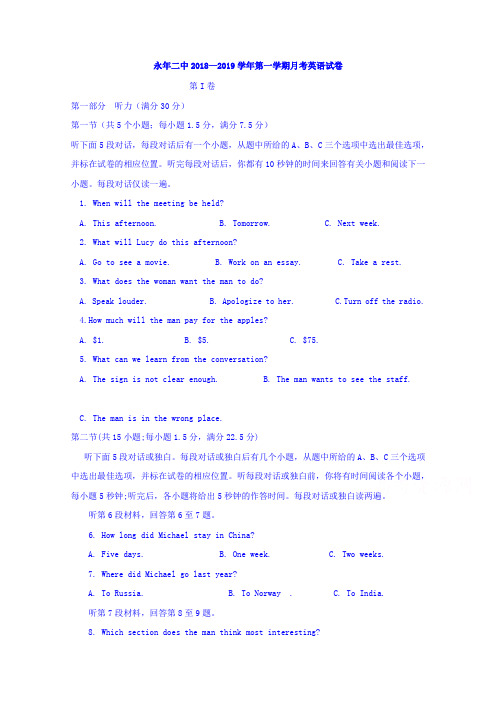
永年二中2018—2019学年第一学期月考英语试卷第I卷第一部分听力(满分30分)第一节(共5个小题;每小题1.5分,满分7.5分)听下面5段对话,每段对话后有一个小题,从题中所给的A、B、C三个选项中选出最佳选项,并标在试卷的相应位置。
听完每段对话后,你都有10秒钟的时间来回答有关小题和阅读下一小题。
每段对话仅读一遍。
1. When will the meeting be held?A. This afternoon.B. Tomorrow.C. Next week.2. What will Lucy do this afternoon?A. Go to see a movie.B. Work on an essay.C. Take a rest.3. What does the woman want the man to do?A. Speak louder.B. Apologize to her.C.Turn off the radio.4.How much will the man pay for the apples?A. $1.B. $5.C. $75.5. What can we learn from the conversation?A. The sign is not clear enough.B. The man wants to see the staff.C. The man is in the wrong place.第二节(共15小题;每小题1.5分,满分22.5分)听下面5段对话或独白。
每段对话或独白后有几个小题,从题中所给的A、B、C三个选项中选出最佳选项,并标在试卷的相应位置。
听每段对话或独白前,你将有时间阅读各个小题,每小题5秒钟;听完后,各小题将给出5秒钟的作答时间。
每段对话或独白读两遍。
听第6段材料,回答第6至7题。
6. How long did Michael stay in China?A. Five days.B. One week.C. Two weeks.7. Where did Michael go last year?A. To Russia.B. To Norway .C. To India.听第7段材料,回答第8至9题。
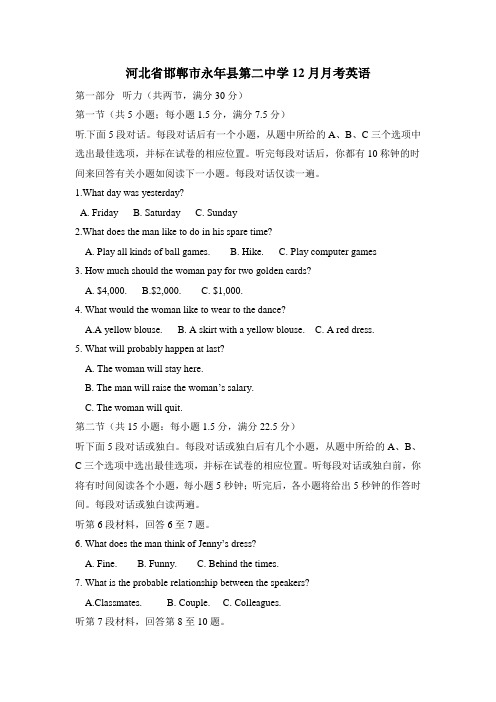
河北省邯郸市永年县第二中学12月月考英语第一部分听力(共两节,满分30分)第一节(共5小题;每小题1.5分,满分7.5分)听下面5段对话。
每段对话后有一个小题,从题中所给的A、B、C三个选项中选出最佳选项,并标在试卷的相应位置。
听完每段对话后,你都有10称钟的时间来回答有关小题如阅读下一小题。
每段对话仅读一遍。
1.What day was yesterday?A. FridayB. SaturdayC. Sunday2.What does the man like to do in his spare time?A. Play all kinds of ball games.B. Hike.C. Play computer games3. How much should the woman pay for two golden cards?A. $4,000.B.$2,000.C. $1,000.4. What would the woman like to wear to the dance?A.A yellow blouse.B. A skirt with a yellow blouse.C. A red dress.5. What will probably happen at last?A. The woman will stay here.B. The man will raise the woman’s salary.C. The woman will quit.第二节(共15小题:每小题1.5分,满分22.5分)听下面5段对话或独白。
每段对话或独白后有几个小题,从题中所给的A、B、C三个选项中选出最佳选项,并标在试卷的相应位置。
听每段对话或独白前,你将有时间阅读各个小题,每小题5秒钟;听完后,各小题将给出5秒钟的作答时间。
每段对话或独白读两遍。
听第6段材料,回答6至7题。
6. What does the man think of Jenny’s dress?A. Fine.B. Funny.C. Behind the times.7. What is the probable relationship between the speakers?A.Classmates.B. Couple.C. Colleagues.听第7段材料,回答第8至10题。
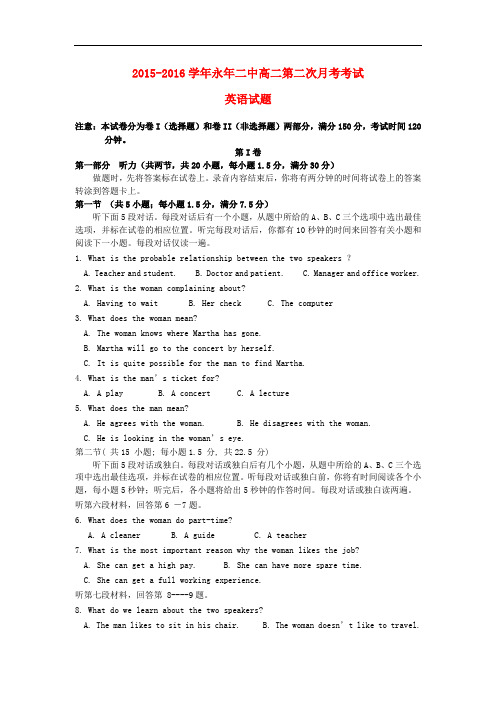
2015-2016学年永年二中高二第二次月考考试英语试题注意:本试卷分为卷I(选择题)和卷II(非选择题)两部分,满分150分,考试时间120分钟。
第I卷第一部分听力(共两节,共20小题,每小题1.5分,满分30分)做题时,先将答案标在试卷上。
录音内容结束后,你将有两分钟的时间将试卷上的答案转涂到答题卡上。
第一节(共5小题;每小题1.5分,满分7.5分)听下面5段对话。
每段对话后有一个小题,从题中所给的A、B、C三个选项中选出最佳选项,并标在试卷的相应位置。
听完每段对话后,你都有10秒钟的时间来回答有关小题和阅读下一小题。
每段对话仅读一遍。
1. What is the probable relationship between the two speakers ?A. Teacher and student.B. Doctor and patient.C. Manager and office worker.2. What is the woman complaining about?A. Having to waitB. Her checkC. The computer3. What does the woman mean?A. The woman knows where Martha has gone.B. Martha will go to the concert by herself.C. It is quite possible for the man to find Martha.4. What is the man’s ticket for?A. A playB. A concertC. A lecture5. What does the man mean?A. He agrees with the woman.B. He disagrees with the woman.C. He is looking in the woman’s eye.第二节( 共15 小题; 每小题1.5 分, 共22.5 分)听下面5段对话或独白。
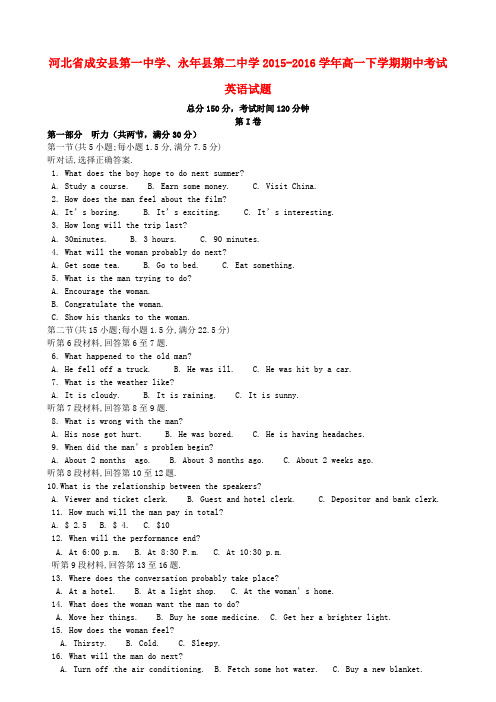
河北省成安县第一中学、永年县第二中学2015-2016学年高一下学期期中考试英语试题总分150分,考试时间120分钟第I卷第一部分听力(共两节,满分30分)第一节(共5小题;每小题1.5分,满分7.5分)听对话,选择正确答案.1. What does the boy hope to do next summer?A. Study a course.B. Earn some money.C. Visit China.2. How does the man feel about the film?A. It’s boring.B. It’s exciting.C. It’s interesting.3. How long will the trip last?A. 30minutes.B. 3 hours.C. 90 minutes.4. What will the woman probably do next?A. Get some tea.B. Go to bed.C. Eat something.5. What is the man trying to do?A. Encourage the woman.B. Congratulate the woman.C. Show his thanks to the woman.第二节(共15小题;每小题1.5分,满分22.5分)听第6段材料,回答第6至7题.6. What happened to the old man?A. He fell off a truck.B. He was ill.C. He was hit by a car.7. What is the weather like?A. It is cloudy.B. It is raining.C. It is sunny.听第7段材料,回答第8至9题.8. What is wrong with the man?A. His nose got hurt.B. He was bored.C. He is having headaches.9. When did the man’s problem begin?A. About 2 months ago.B. About 3 months ago.C. About 2 weeks ago.听第8段材料,回答第10至12题.10.What is the relationship between the speakers?A. Viewer and ticket clerk.B. Guest and hotel clerk.C. Depositor and bank clerk.11. How much wi ll the man pay in total?A. $ 2.5B. $ 4.C. $1012. When will the performance end?A. At 6:00 p.m.B. At 8:30 P.m.C. At 10:30 p.m.听第9段材料,回答第13至16题.13. Where does the conversation probably take place?A. At a hotel.B. At a light shop.C. At the woman’s home.14. What does the woman want the man to do?A. Move her things.B. Buy he some medicine.C. Get her a brighter light.15. How does the woman feel?A. Thirsty.B. Cold.C. Sleepy.16. What will the man do next?A. Turn off the air conditioning.B. Fetch some hot water.C. Buy a new blanket.听第10段材料,回答第17至20题.17. How does the man feel?A. Tired.B. Anxious.C. Delighted.18. What can we learn about the woman?A. She got a new house.B. She bought a new car.C. She lives near workplace.19. What does the woman advise the man to do?A. To move into her apartment.B. To talk with his landlord.C. To change his job.20. How far is it from the woman’s apartment to the man’s office?A. 15 minutes’ car ride.B. 15 minutes’ bike ride.C. 15minutes’ walk.第二部分阅读理解(共20小题;每小题2分,满分40分)第一节(共15小题;每小题2分,满分30分)阅读下列短文,从每题所给的四个选项(A 、B 、C 和 D )中,选出最佳选项,并在题卡上将该项涂黑。
河北省邯郸市永年区第二中学2018-2019学年高二英语上学期第一次月考试题编辑整理:尊敬的读者朋友们:这里是精品文档编辑中心,本文档内容是由我和我的同事精心编辑整理后发布的,发布之前我们对文中内容进行仔细校对,但是难免会有疏漏的地方,但是任然希望(河北省邯郸市永年区第二中学2018-2019学年高二英语上学期第一次月考试题)的内容能够给您的工作和学习带来便利。
同时也真诚的希望收到您的建议和反馈,这将是我们进步的源泉,前进的动力。
本文可编辑可修改,如果觉得对您有帮助请收藏以便随时查阅,最后祝您生活愉快业绩进步,以下为河北省邯郸市永年区第二中学2018-2019学年高二英语上学期第一次月考试题的全部内容。
永年二中2018—2019学年第一学期10月月考试卷高二英语第I卷第一部分;听力(共两节,满分30分)第一节(共5小题;每小题1。
5分,满分7。
5分)听下面5段对话。
每段对话后有一个小题,从题中所给的A、B、C三个选项中选出最佳选项,并标在试题卷的相应位置。
听完每段对话后,你都有10秒钟的时间来回答有关小题和阅读下一小题。
每段对话仅读一遍.1.How is the weather in the woman’s opinion?A。
Warm B. Cold C。
Hot2。
What does the man mean?A。
He already has plans.B。
The woman should decide。
C。
He will make a reservation。
3. Why did the man go to Beijing?A. To visit his parents。
B. To have an interview。
C。
To receive job training。
4。
What are the two speakers talking about?A. What to take up as a hobby。
河北省永年县第二中学2016届高三11月月考英语试题第I卷第一部分听力(共两节,满分30分)第一节(共5小题; 每小题1.5分,满分7.5分)听下面5段对话。
每段对话后有一个小题,从题中所给的A、B、C三个选项中选出最佳选项,并标在试卷的相应位置。
听完每段对话后,你都有10秒钟的时间来回答有关小题和阅读下一小题。
每段对话仅读一遍。
1. When will the military parade in Beijing start?A. In 20 minutes.B. In 15 minutes.C. In half an hour.2. What will the woman do this afternoon?A. Help with her sister’s study.B. Go to Wang Anshi Museum.C. Visit her sister.3. What are the two speakers mainly talking about?A. The man’s brother.B. The man’s Apple watch.C. The man’s birthday.4. What was the weather like in Australia then?A. Rainy.B. Terrible.C. Nice.5. Where does the conversation take place?A. At a bankB. In a police office.C. At a market.第二节:(共15小题:每小题1.5分,满分22.5分)听下面5 段对话或独白。
每段对话或独白后有几个小题,从题中所给的A、B、C三个选项中选出最佳选项,并标在试卷的相应位置。
听每段对话或独白前,你将有时间阅读各个小题,每小题 5 秒钟;听完后,各小题将给出 5 秒钟的作答时间。
永年二中2018—2019学年第一学期月考英语试卷第I卷第一部分听力(满分30分)第一节(共5个小题;每小题1.5分,满分7.5分)听下面5段对话,每段对话后有一个小题,从题中所给的A、B、C三个选项中选出最佳选项,并标在试卷的相应位置。
听完每段对话后,你都有10秒钟的时间来回答有关小题和阅读下一小题。
每段对话仅读一遍。
1. When will the meeting be held?A. This afternoon.B. Tomorrow.C. Next week.2. What will Lucy do this afternoon?A. Go to see a movie.B. Work on an essay.C. Take a rest.3. What does the woman want the man to do?A. Speak louder.B. Apologize to her.C.Turn off the radio.4.How much will the man pay for the apples?A. $1.B. $5.C. $75.5. What can we learn from the conversation?A. The sign is not clear enough.B. The man wants to see the staff.C. The man is in the wrong place.第二节(共15小题;每小题1.5分,满分22.5分)听下面5段对话或独白。
每段对话或独白后有几个小题,从题中所给的A、B、C三个选项中选出最佳选项,并标在试卷的相应位置。
听每段对话或独白前,你将有时间阅读各个小题,每小题5秒钟;听完后,各小题将给出5秒钟的作答时间。
每段对话或独白读两遍。
听第6段材料,回答第6至7题。
6. How long did Michael stay in China?A. Five days.B. One week.C. Two weeks.7. Where did Michael go last year?A. To Russia.B. To Norway .C. To India.听第7段材料,回答第8至9题。
邯郸市永年县第二中学12月月考英语试卷2014.12第一部分听力(共两节,满分30分)第一节(共5小题;每小题1.5分,满分7.5分)听下面5段对话。
每段对话后有一个小题,从题中所给的A、B、C三个选项中选出最佳选项,并标在试卷的相应位置。
听完每段对话后,你都有10称钟的时间来回答有关小题如阅读下一小题。
每段对话仅读一遍。
1.What day was yesterday?A. FridayB. SaturdayC. Sunday2.What does the man like to do in his spare time?A. Play all kinds of ball games.B. Hike.C. Play computer games3. How much should the woman pay for two golden cards?A. $4,000.B.$2,000.C. $1,000.4. What would the woman like to wear to the dance?A.A yellow blouse.B. A skirt with a yellow blouse.C. A red dress.5. What will probably happen at last?A. The woman will stay here.B. The man will raise the woman’s salary.C. The woman will quit.第二节(共15小题:每小题1.5分,满分22.5分)听下面5段对话或独白。
每段对话或独白后有几个小题,从题中所给的A、B、C三个选项中选出最佳选项,并标在试卷的相应位置。
听每段对话或独白前,你将有时间阅读各个小题,每小题5秒钟;听完后,各小题将给出5秒钟的作答时间。
每段对话或独白读两遍。
听第6段材料,回答6至7题。
河北省永年县第二中学2016届高三英语11月月考(期中)试题第I卷第一部分听力(共两节,满分30分)第一节(共5小题; 每小题1.5分,满分7.5分)听下面5段对话。
每段对话后有一个小题,从题中所给的A、B、C三个选项中选出最佳选项,并标在试卷的相应位置。
听完每段对话后,你都有10秒钟的时间来回答有关小题和阅读下一小题。
每段对话仅读一遍。
1. When will the military parade in Beijing start?A. In 20 minutes.B. In 15 minutes.C. In half an hour.2. What will the woman do this afternoon?A. Help with her sister’s study.B. Go to Wang Anshi Museum.C. Visit her sister.3. What are the two speakers mainly talking about?A. The man’s brother.B. The man’s Apple watch.C. The man’s birthday.4. What was the weather like in Australia then?A. Rainy.B. Terrible.C. Nice.5. Where does the conversation take place?A. At a bankB. In a police office.C. At a market.第二节: (共15小题:每小题1.5分,满分22.5分)听下面 5 段对话或独白。
每段对话或独白后有几个小题,从题中所给的 A、B、C三个选项中选出最佳选项,并标在试卷的相应位置。
听每段对话或独白前,你将有时间阅读各个小题,每小题 5 秒钟;听完后,各小题将给出 5 秒钟的作答时间。
每段对话或独白读两遍。
听第 6 段材料,回答第 6、7 题。
6. How does the man feel?A. Happy.B. Excited.C. Upset.7. What’s wrong with the man?A. He was knocked down by a car.B. He had a car accident.C. He had an accident when walking on the street.听第 7 段材料,回答第 8 至10 题。
8. What’s the man’s favorite fruit?A. Bananas.B. Peaches.C. Apples.9. When were peaches first planted in China?A. About 750 years ago.B. About 7,500 years ago.C. About 5,700 years ago.10. How many researchers did the study?A. 2.B. 4C. 3听第 8 段材料,回答第 11 至 13 题。
11. What’s wrong with the man’s camera?A. It’s broken.B. It’s out of date.C. It’s missing.12. How do people usually take photos now?A. By using cellphones and iPads.B. By using cameras.C.By photographers.13. What’s the man’s final d ecision?A. He will go to a real store to buy a new camera.B. He will buy a new camera from eBay.C. He decides not to buy a new camera.听第 9 段材料,回答第 14 至 16 题。
14. What’s the trouble with Mrs. Wang and what does she need right now?A. Her pulse runs very slowly and needs an X-ray text.B. She gets tired after running and needs a rest.C. She has a stomachache and needs an operation immediately.15. What is NOT true according to the conversation?A. Mrs. Wang is getting fatter and fatter.B. Mrs. Wang has been sick recently.C. Mrs. Wang’s heart is in a bad state.16. Who has passed away in her family?A. Mrs. Wang’s father.B. Mrs. Wang’s mother.C. Mrs. Wang’s grandfather. 听第 10 段材料,回答第 17 至 20 题。
17. In which country do children sing songs of spring on May Day?A. France.B. Greece.C. Italy.18. How do children in England deal with the pennies?A. Buy some flowers.B. Buy gifts.C. Throw them into a well.19. What do children in the US do on May Day?A. Give each other gifts.B. Sing songs to each other.C. Leave flowers at the doors.20. Where is the text taken from?A. A class presentation.B. A TV program.C. A radio program.第二部分阅读理解(共两节,满分40分)第一节(共15小题;每小题2分,满分30分)阅读下列短文,从每题所给的四个选项(A、B、C和D)中,选出最佳选项,并在答题卡上将该项涂黑。
AHere is a collection of some of the eccentric(古怪的)laws in the world. We can laugh , we can gasp, we can only wonder……1. Think before you chewIn Singapore, chewing gum is prohibited. This rule was introduced because of the high cost and difficulty in removing stuck chewing gum from public premises. In particular, chewing gum stuck on the Mass Rapid Transit train doors stopped the train from moving. It happened a few times and those were a few times too many.2. Lighten upDrivers in Denmark are supposed to drive vehicles with their headlights on. You’d think this law would apply to night driving but it doesn’t . It is considered essential during the day as well or they may face a fine of up to ﹩100.Studies have shown that this has helped a lot to avoid road accidents in Denmark.3. To fail﹥to jailIn Bangladeshi, children 15 and older can be put in jail for cheating on their final examinations. Every year, Bangladeshi government takes strong measures to stop cheating and carries out a massive media campaign to forewarn students through print and television.4.Sue(控告) them pants!In France, it is still against the law for women to wear pants. The law reportedly has been on the books since 1800. It was amended several times: once in 1892 to allow women to sport trousers while riding horses and again in 1909 to permit the ladies to wear pants while on bicycles.5. The law with a flawIn Georgia no bicycle shall be equipped, modified, or altered in such a way as to cause the pedal in its lowermost position to be more than 12 inches above the ground, nor shall any bicycle be operated if so equipped . The question is :Who would ride such a bike?6. One Two Three Go!In Massachusetts at a wake(守丧),mourners may eat no more than three sandwiches. It is one of those laws that was written in books and never removed since then. Bad manners, one might consider it, but in Massachusetts it is a criminal offense.21. How many laws are mentioned in the passage?A . TwoB .Three C. Six D. Five22. In which country is chewing gum not allowed ?A. SingaporeB. AmericaC. FranceD. China23. Which is Not true according to the passage ?A. In Bangladesh, children 15 and younger can be put in jail for cheating.B. In Georgia no bicycle shall be equipped .C. In France it is still against the law for women to wear pants.D. Drivers in Denmark are supposed to drive vehicles with their headlights on.BNot all memories are sweet. Some people spend all their lives trying to forget bad experiences. Violence and traffic accidents can leave people with terrible physical and emotional scars. Often they relive these experiences in nightmares.Now American researchers think they are close to developing a pill, which will help people forget bad memories. The pill is designed to be taken immediately after a frightening experience. They hope it might reduce, or possibly wipe out, the effect of painful memories.In November, experts tested a drug on people in the US and France . The drug stops the body releasing chemicals that fix memories in the brain. So far the research has suggested that only the emotional effects of memories may be reduced , not that the m emories are wiped out . They are not sure to what degree people’s memories are affected.The research has caused a great deal of argument. Some think it is a bad idea, while others support it.Supporters say it could lead to pills that prevent or trea t soldiers’ troubling memories after war.They say that there are many people who suffer from terrible memories.“Some memories can ruin people’s lives. They come back to you when you don’t want to have them in a daydream or nightmare. They usually come with very painful emotions,” said Roger Pitman, a professor of psychiatry at Harvard Medical School. “This could relieve a lot of that suffering.”But those who are against the research say that maybe the pills can change people’s memories and changing me mories is very dangerous because memories give us our identity. They also help us all avoid the mistakes of the past.“All of us can think of bad events in our lives that were terrible at the time but make us who we are . I’m not sure we want to wipe those memories out.” Said Rebcca Dresser , a medical ethicist.24.The passage is mainly aboutA. a new medical inventionB. a new research on the pill -C. a way of wiping out painful memoriesD. an argument about the research on the pill25. The drug tested on people canA. cause the brain to fix memoriesB. stop people remembering bad experiencesC. prevent body producing certain chemicalsD. wipe out the emotional effect of memories26.We can infer from the passage thatA. people doubt the effect of the pillsB. the pills will certainly stop people’s emotional memoriesC. taking the pill will do harm to people’s physical healthD. the pill has already been produced and used by the public in the US27. Which of the following does Rebecca Dresser agree with in the last paragraph?A. Some memories can ruin people’s lives.B. People want to get rid of bad memories .C. Experiencing bad events makes us different from others.D. The pill will reduce peo ple’s sufferings from bad memories.CWith around 100 students scheduled to be in that 9:00 am Monday morning lecture, it is no surprise that almost 20 people actually make it to the class and only 10of them are still awake after the first 15 minutes; it is not even a surprise that most of them are still in their pyjamas(睡衣). Obviously, students are terrible at adjusting their sleep cycles to their daily schedule.All human beings possess a body clock. Along with other alerting(警报) systems, this governs the sleep/wake cycle and is therefore one of the main processes which govern sleep behaviour. Typically, the preferred sleep/wake cycle is delayed in adolescents, which leads to many students not feeling sleepy until much later in the evenings. This typic al sleep pattern is usually referred to as the “night owl”schedule of sleep.This is opposed to the “early bird” schedule, and is a kind of disorder where the individual tends to stay up much past midnight . Such a person has great difficulty in waking up in the mornings. Research suggests that night owls feel most alert and function best in the evenings and at night. Research findings have shown that about 20 percent of people can be classified as “night owls” and only 10 percent can be classified as “early birds” ——the other 70 percent are in the middle. Although this is clearly not true for all students, for the ones who are true night owls this gives them an excellent excuse for missing their lectures which unfortunately fall before midday.28. What does the author stress in Paragraph 1 ?A. Many students are absent from class.B. Students are very tired on Monday mornings.C. Students do not adjust their sleep patterns well.D. Students are not well prepared for class on Mondays.29. Which of the following is true according to Paragraph 2?A . Most students prefer to get up late in the morning.B. Students don’t sleep well because of alerting systems.C .One’s body clock governs the sleep/wake cycle indepen dently.D. Adolescents’ delayed sleep/wake cycle isn’t the preferred pattern.30. Which of the following is closest in meaning to the underlined word “classified”?A. CriticizedB. GroupedC. OrganizedD. Named31. What does the text mainly talk about?A. Functions of the body clock.B. The “night owl” phenomenon.C. Human beings’ sleep behaviour.D. The school schedule of “early birds”.DThe surprising experiment I am about to describe proves that air is all around you and that it presses down upon you. Air pressure is a powerful force. When you swim underwater, you can feel water pushing on your body. The air all around you does the same. However, your body is so used to it that you do not notice this. The pressure is caused by a layer of air called the atmosphere. This layer surrounds the Earth, extending to about five kilometers above the Earth’s surface.The following experiment is an easy one that you can do at home. But make sure that you are supervised, because you will need to use matches. Now for the experiment! What you need●A hard-boiled egg without the shell●A bottle with a neck slightly smaller than the egg●A piece of paper● A matchMethodCheck that the egg will sit firmly on the neck of the bottle.Tear the paper into strips and put the strips into the bottle.Light the paper by dropping a burning match into the bottle.Quickly sit the egg on the neck of the bottle.ResultAstonishingly, the egg will be sucked into the bottle. Your friends will be amazed when you show them the experiment. But be careful when you handle matches.Why it happenedAs the paper burns, it needs oxygen and uses up the oxygen(air) in the bottle. The egg acts as a seal in the neck of the bottle,so no more air can get inside. This reduces the air pressure inside the bottle. The air pressure must equalize, so more air from outside must enter the bottle. The outside air presses against the egg and then the egg is pushed into the bottle! This proves that air is all around and that it is pressing down on us.32. Why is there the need to take care when you are doing the experiment?A. The bottle could break.B. You need to light the paper with a match.C. The egg needs to be shelled.D. The egg has to be perfectly placed on the neck of the bottle.33. In the experiment, the burning inside the bottle can .A .equalize the air pressure inside and outsideB. make a seal in the neck of the bottleC. finish up the oxygen inside the bottleD. Produce more oxygen inside the bottle34. How did the egg get into the bottle?A. The oxygen inside the bottle sucked the egg in.B. It became soft without the shell.C. The neck of the bottle was wide enough.D. The outside air pressure forced it into the bottle.35. The experiment is carried out to prove .A. water pushes on your body when you swim underwaterB. the earth is surrounded by a layer of air called the atmosphereC. the pressure of air around us has a powerful forceD. the air pressure is not equalized around us第二节(共5小题;每小题2分,满分10分)根据短文内容,从短文后的选项中选出能填入空白处的最佳选项。